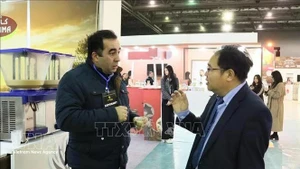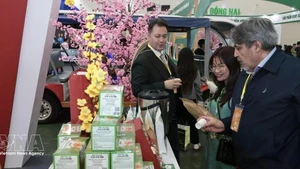In some places, people have been queuing for hours to buy gold only to discover that none was available — a sight that has become a worrying phenomenon.
In response, the Government Office has issued a document relaying Deputy Prime Minister Nguyen Hoa Binh’s request for urgent inspections and corrective measures to ensure the gold market operates in a transparent and healthy manner, without jeopardising macroeconomic stability.
This decisive move by the government is aimed not only at quickly rectifying potential violations, such as gold hoarding to create artificial scarcity, but also at protecting consumers’ rights and safeguarding economic stability.
The inspection directive comes just days after the government issued Decree 232 amending and supplementing Decree 24 issued in 2012 on the management of gold trading activities. The new decree, which will take effect on October 10, 2025, is seen as an important turning point, establishing a new legal framework for the gold market.
Under the new regulations, the state monopoly on the production of gold bars and the import and export of raw gold has been officially abolished. Instead, a new mechanism opens the way, under specific conditions, for qualified enterprises and commercial banks to participate, with the aim of making the gold market more transparent. This strategic change is intended to increase official supply, reduce scarcity, and help stabilise the market.
Notably, the decree requires all gold transactions worth 20 million VND (approximately 758 USD) or more per day to be conducted through payment accounts at banks. In addition, enterprises authorised to trade raw gold must issue electronic invoices, store data, and connect directly with the central bank’s system.
Ending the monopoly and allowing enterprises and commercial banks to participate in gold bar production could create a more competitive and transparent market. The domestic supply of gold bars is expected to become more abundant, helping to narrow the price gap with global markets.
However, experts caution that this liberalisation does not mean deregulation. Licensing procedures, minimum capital requirements, and quality control measures will serve as safeguards ensuring only truly capable organisations can take part.
In the long term, these reforms could help stabilise the gold market, curb speculation and provide an additional official investment channel. In the short term, however, domestic gold prices are still expected to fluctuate sharply, posing risks for small-scale investors.
Amid continuing global economic uncertainties, maintaining macroeconomic stability remains the top priority. Any instability in the gold market, if left unchecked, could spill over into financial and monetary markets, putting pressure on exchange rates, interest rates, and inflation.
Market confidence can only be strengthened when people and businesses clearly see transparency and openness in market management.
The government’s bold decisions — particularly Decree 232 and the comprehensive inspection — are aimed not only at addressing immediate shortcomings, but more importantly, at laying the foundation for the transparent, efficient and sustainable development of Viet Nam’s gold market.
















